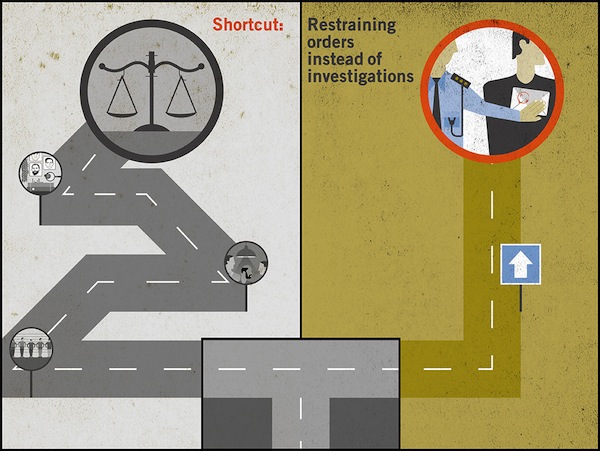Instead of regular criminal proceedings against Israelis who commit crimes against Palestinians, the police cut corners using military administrative orders.
By Ziv Stahl, written for Yesh Din
Yesh Din’s latest report, Mock Enforcement, takes a long, hard look at law enforcement vis-à-vis Israeli citizens who commit crimes against Palestinians in the occupied territories. Data collected for the report indicates that law enforcement in the West Bank is ineffectual, and that the absence of a functional system has led to solutions that circumvent the problem so as to maintain a facade of minimal public order in the West Bank.
Instead of regular criminal proceedings, complete with professional investigations, indictments, prosecutions and convictions — a process designed to enforce the law and create deterrence — the police cut corners through the use of administrative orders.
There are two kinds of administrative orders currently in use:
1. Closure orders, commonly known as “closed military zone orders.” These orders enable the military commander to declare an area closed and seal it off, prohibiting or limiting entry. Both the army and the police are certain that closure orders “bring calm to friction zones” since all parties – Israelis and Palestinians – are removed from areas where a dispute is taking place. This, in their mind, prevents both sides from committing offenses. But because closure orders restrict access to farmland owned by Palestinians, they harm the legal landowners instead of protecting them from potential harm.

In addition to temporary orders issued for specific areas, vast areas are subject to permanent closure orders — mainly land adjacent to settlements — in a way that regularly prevents Palestinians from accessing their land. Use of such closure orders harms the ability of Palestinian farmers to tend to their land and live off of it. In the long term, given the land laws Israel enforces in the West Bank, lack of access and cultivation could lead to loss of rights to land.
2. Individual administrative order issued against Israeli citizens, which bar an individual from entering the West Bank; restraining orders confine an individual to a specific locality or a home. Such orders are used frequently, compared with the number of indictments served against Israeli citizens who commit offenses against Palestinians. The military commander issues such orders against settlers marked by law enforcement agencies following ISA (Israel Security Agency) or police recommendations. The accused individuals are not informed of the allegations or given a fair chance to challenge them, and the evidence compiled against them remains classified. The military commander is authorized to use the most powerful means in a completely arbitrary fashion.
The absence of a functional, efficient law enforcement apparatus — capable of conducting proper investigations, collecting effective intelligence and stationing a large number of troops in known problem areas — leads to the use of administrative orders that by-pass the criminal justice system. Moreover, the use of administrative orders is simply undemocratic and violates human rights. Failing to improve the quality of investigations, which would lead to successful criminal proceedings against offenders, as well as reasonable enforcement and deterrence, the system prefers administrative measures. They do not require an investment of human resources, time, effort or money. All they require is the GOC Central Command’s signature.
A version of this post was first published on Yesh Din’s blog.


